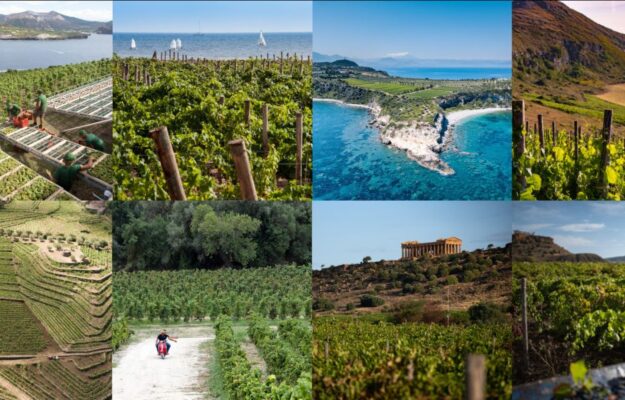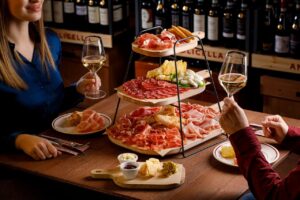Increasingly young, but under the sign of the family; increasingly dynamic and innovative; increasingly attentive to quality, in every aspect, from the product to hospitality, and to all-round sustainability: environmental, social and economic. These are the characteristics of the wineries that are part of Assovini Sicilia, a pioneering project founded in 1998 by Giacomo Rallo, Diego Planeta and Lucio Tasca, and which today has 101 member wineries producing about 900 labels from which more than 80% of the value of bottled Sicilian wine is generated. A dynamic and contemporary association, capable of renewing itself and adapting over time, it has already charted a course for the future by focusing on wine tourism, sustainability, innovation, research, experimentation, and the role of the new generations, as told by the photograph taken by professors Tindara Abbate and Alessandra Costa of the Department of Economics of the University of Messina in the 2024 report “Cultivating the future. The Sicily of wine tells its story,” commissioned by the wine association led by Mariangela Cambria. According to the report from the Department of Economics of the University of Messina, in 95% of Assovini Sicilia’s wineries, family members are directly involved in business management. Within this framework of continuity and stability, generational transition within family businesses is a reality: about 78% of companies have already integrated a new generation into business management.
“With Assovini Sicilia begins the renaissance of Sicilian wine, understood as a new era that has united the quality of the wine produced by the wineries with their ability to convey the history, the Sicilian culture through wine”, comments Mariangela Cambria, president of Assovini Sicilia. “After 25 years, Assovini has won its challenge: the Sicily of wine is a contemporary, dynamic, modern Sicily, able to tell and tell its story through wine as part of a choral project where individual stories intertwine and compose an extraordinary mosaic of territories. A new image that has allowed Sicily to be perceived as a wine continent that makes its biodiversity its wealth”.
The production of Assovini Sicilia wineries, the report goes on to explain, is distinguished by quality, the search for new styles and experimentation, in line with the vocation of the territory, the variety of wine and types that intercept new market trends. According to the report's data, 47.6 million bottles will be produced in 2023 by the 80 wineries that responded to the survey: 83% produce Doc wines, while the percentage of members that produced sparkling wines in 2023 is significant (55.6%). In the island of extraordinary ampelographic richness - more than 70 native varieties - the interest in the relic vines of Lucignola and Vitrarolo, and some grapes of local historical interest, such as Corinto Nero, Albanello, Nocera and Vermentino, stands out. Moreover, Assovini Sicilia companies show great attention to authenticity and strong innovative orientation, as evidenced by 22% of companies participating in vineyard experimentation projects and 20.3% of companies that have activated projects with research institutions.
The future of Assovini Sicilia companies follows the route of innovation, sustainability and digital transformation defining their competitive ability in the market. The green heart of the island is represented by a significant 65% of companies that have invested in the use of renewable energy sources; 56.5% of companies have already acquired sustainability certifications and 76.1% of companies responding to the survey have already obtained organic certification. “Assovini Sicilia’s commitment to supporting sustainability is confirmed by the SOStain Sicilia Foundation, a program for Sicilian viticulture, promoted by the Consorzio di Tutela Vini Doc Sicilia and Assovini Sicilia, with the aim of certifying the sustainability of the regional wine sector”, the association stresses. Which adds how, driven by the wind of change, 89.1% of wine companies said they had introduced various innovations covering numerous types, from process, market, organization, product and supply innovations.
There is also strong investment in wine tourism, which is increasingly becoming a “wine experience”. The future of Sicilian wineries focuses on winery experiences and local involvement by assigning wine tourism the role of ambassador of Sicily to the world. The winery and the vineyard are not only places of production and tasting, but cultural spaces. For the wineries of Assovini Sicilia, wine tourism represents one of the most authentic expressions of the union between passion for wine and the discovery of the territory as evidenced by that 84.8% of companies that have already implemented wine tourism services.
Assovini Sicilia companies stand out for their dynamism and ability to adapt to their rapidly changing environment. 56.5% of companies perceive their competitiveness as moderate, suggesting that while they are well positioned in the market, they see room for improvement and opportunities for growth. A significant minority of firms describe themselves as “very competitive” (28.3%): these are firms that have been able to differentiate themselves in the market through distinctive elements, such as product quality and excellence, as well as efficient branding strategies. A further 10.9% of companies, on the other hand, describe themselves as uncompetitive: this could reflect not only specific challenges (small size, scarcity of resources, logistical difficulties) that companies face, but could be an expression of the more local dimension of business operations. Finally, only 4.3% of firms consider themselves to be uncompetitive, perhaps indicating the urgency of a renewal of business structure or realignment of business strategy in light of new global challenges.
Still, according to the report, the “perceived” positioning of Assovini Sicilia businesses is strongly influenced by the competitive advantages each company has. In fact, product quality is the mainstay of competitiveness for 91.3% of enterprises, reflecting their commitment and constant attention to winemaking excellence, supported by agricultural practices and winemaking techniques that enhance grape quality. Added to this is the uniqueness of the territory, perceived as a source of competitive advantage by 84.8% of enterprises: it is not only the quality of the product that attracts consumers and visitors from all over the world, but also the morphological and climatic characteristics of the Sicilian territory, which are obviously reflected in the quality and characteristics of the wines. On the other hand, 82.6% of companies recognize customer relationships as a factor in competitiveness: establishing strong and deep ties with consumers not only helps build trust and loyalty to the company, but also stimulates companies’ innovation processes, which more quickly can adapt to new market trends. Wine-tourism strategies (26.1%) and innovations in production and marketing (23.9%) also represent strong growth areas for businesses that want to improve the attractiveness of their offerings, making them more sustainable over time. On the other hand, digital presence is seen as critical by 19.6% of companies: it is the tool through which companies are able to extend their operations, improving communication with end customers to adapt more quickly to market dynamics. Last but not least, one enterprise listed agricultural and production consistency as a factor of competitiveness.
The relevance of competitiveness factors is closely linked to the rapidly changing context factors that shape both the day-to-day operations and long-term strategies of companies. These context factors directly determine how companies position themselves and react in the market, highlighting the importance of adaptability to remain competitive in the market. 73.9% of companies are aware of the increased interest in sustainability, requiring the implementation of sustainable, environmentally friendly practices. Similarly, consumer tastes are changing (54.3%), requiring the company to diversify its products and identify new business areas to meet evolving expectations. 34.8% of businesses have identified new opportunities through technological changes, especially in terms of sustainability and wine tourism offerings. Similarly, 34.8% of businesses highlighted the growing demand for new products as an additional push for innovative activities to keep consumer interest high. Such a complex system of contextual factors, however, reveals the need for enterprises to maintain an agile and proactive structure in order to predict and anticipate industry trends, and to have an appropriate medium- and long-term strategy to meet market challenges. In this regard, 43.5% of companies say they have a clear and detailed strategy, highlighting a well-structured approach in terms of strategic market positioning. This shows that a significant portion of enterprises have not only identified their strategic directions, but also articulated them concretely. In contrast, about 52.2% of firms said they have a basic strategy, which requires further detail: these are firms that are aware of the need for a planning strategy, but may be in the early stages of defining it. Finally, only 4.3% said they did not have a medium- to long-term strategy, suggesting greater vulnerability to market changes and competitiveness. However, these are firms that have suitable skills and resources to a high (32.6%) or moderate (63%) degree, compared to only 4.4% that have significant gaps in terms of skills and resources for strategic planning.
However, Assovini Sicilia companies have experienced a positive performance, with a significant percentage of them seeing their performance improve: while 26.1% indicate that their performance has improved a lot, 41.3% noted a slight improvement. This testifies to how well companies are responding to new global challenges and have managed to consolidate their competitive position in the market. At the same time, 28.3% of enterprises found stable performance, suggesting resilience in the sector. Only a small percentage of firms (4.3%) found a deterioration in performance, although not significant. Looking at sales in the local and national market, the data confirm this positive trend. 17.4% of businesses saw a significant increase in sales, in addition to the 41.3% of businesses that saw a moderate increase. This testifies to how the domestic market continues to be a key pillar for sales. Against this, 32.6% of firms experienced stable sales, again suggesting increased resilience in a changing economic environment. Against this, only 8.7% experienced a reduction in sales, with no significant losses. These figures underscore the effectiveness of Assovini companies’ strategies, which have been able to not only preserve but also expand their market presence.
Finally, all enterprises exported their products abroad. Europe is confirmed as the main export market, for 95.7% of the companies, underlining the strong integration of Sicilian wine on the continent. This is followed by North America for 82.6% of the enterprises underlining the interest in quality and authenticity wines. Asia emerges as a significant market for 63% of companies, thus underlining the success of internationalization strategies in markets with tastes and preferences different from those of European consumers. Oceania, with 30.4%, indicates an interesting market penetration, probably concentrated in Australia and New Zealand, known for their wine-loving clientele. In contrast, South America is the international outlet market for only 15.2% of companies. Finally, only 6.5% of firms listed Africa as their international market. This probably reflects greater logistical and market difficulties, which limit the competitiveness of Sicilian wines.
“In a land where each of us can find a piece of our own DNA, where so many civilizations have mixed, where there are at least 4 different climates, where the dialects of 70 native grape varieties are spoken, where the harvest lasts at least 100 days, today it is finally possible, thanks to the entrepreneurial ability of the new generations of winemakers who have taken over the work of the previous ones, to read in the most transparent way the true voice of Sicilian wines. A voice that reveals a contemporaneity found in very few other regions of Italy”, commented Filippo Bartolotta, journalist and wine educator, during his speech in Rome at the presentation of the report at Palazzo Grazioli these days at the Foreign Press Association in Italy, which was also an opportunity to announce the partnership between Assovini Sicilia and the association La Sicilia di Ulisse, which brings together charming hotels, restaurants and wineries of excellence. “We are excited to inaugurate our collaboration with Assovini Sicilia, a partner with whom we share the mission of enhancing the heritage of our island, where food and wine, hospitality, culture and traditions are inextricably intertwined. For more than two decades, our Association has been committed to offering travelers an authentic experience of Sicily among food, wine and luxury hôtellerie. For us, wine tourism is a perfect marriage between a passion for wine and the discovery of the land, which is why we are happy to participate in Assovini’s promotional events in Italy and abroad. We believe that the union between the haute cuisine of our chefs and the wines of our member wineries is the best way to introduce the world to the tastes, scents and aromas that make Sicily a unique destination”, says Tony Lo Coco, president La Sicilia di Ulisse.
Copyright © 2000/2025
Contatti: info@winenews.it
Seguici anche su Twitter: @WineNewsIt
Seguici anche su Facebook: @winenewsit
Questo articolo è tratto dall'archivio di WineNews - Tutti i diritti riservati - Copyright © 2000/2025


























































































































































































